Management and Operations: Role of Leader and Manager in Unilever Company
VerifiedAdded on 2023/06/18
|15
|4184
|232
AI Summary
This report covers the role of manager and leader in an organization, with a base of Unilever company case study. It analyzes different management and leadership theories and models, key approaches to operational management, and the importance of operation management in achieving Unilever company objectives.
Contribute Materials
Your contribution can guide someone’s learning journey. Share your
documents today.
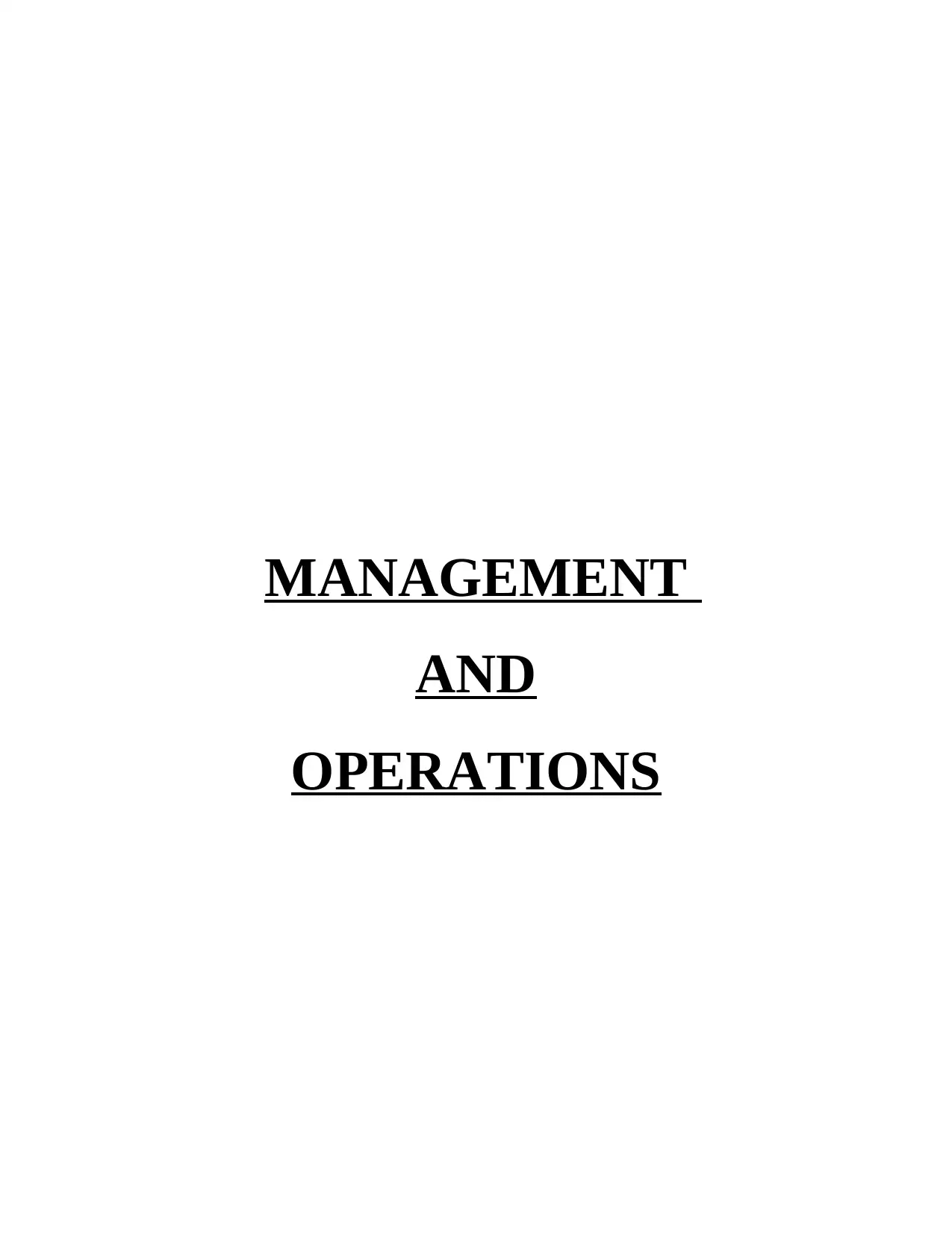
MANAGEMENT
AND
OPERATIONS
AND
OPERATIONS
Secure Best Marks with AI Grader
Need help grading? Try our AI Grader for instant feedback on your assignments.
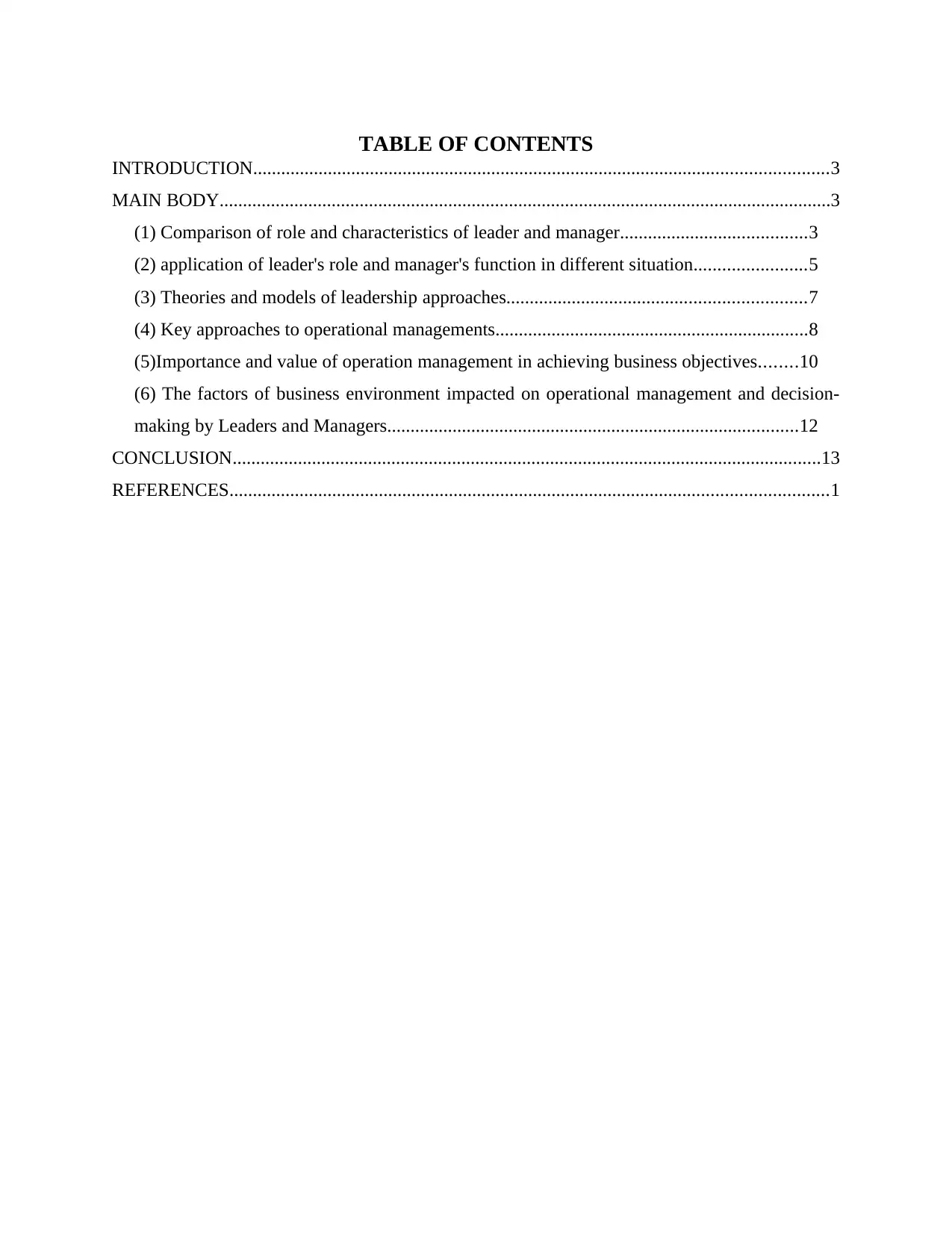
TABLE OF CONTENTS
INTRODUCTION...........................................................................................................................3
MAIN BODY...................................................................................................................................3
(1) Comparison of role and characteristics of leader and manager........................................3
(2) application of leader's role and manager's function in different situation........................5
(3) Theories and models of leadership approaches................................................................7
(4) Key approaches to operational managements...................................................................8
(5)Importance and value of operation management in achieving business objectives........10
(6) The factors of business environment impacted on operational management and decision-
making by Leaders and Managers........................................................................................12
CONCLUSION..............................................................................................................................13
REFERENCES................................................................................................................................1
INTRODUCTION...........................................................................................................................3
MAIN BODY...................................................................................................................................3
(1) Comparison of role and characteristics of leader and manager........................................3
(2) application of leader's role and manager's function in different situation........................5
(3) Theories and models of leadership approaches................................................................7
(4) Key approaches to operational managements...................................................................8
(5)Importance and value of operation management in achieving business objectives........10
(6) The factors of business environment impacted on operational management and decision-
making by Leaders and Managers........................................................................................12
CONCLUSION..............................................................................................................................13
REFERENCES................................................................................................................................1
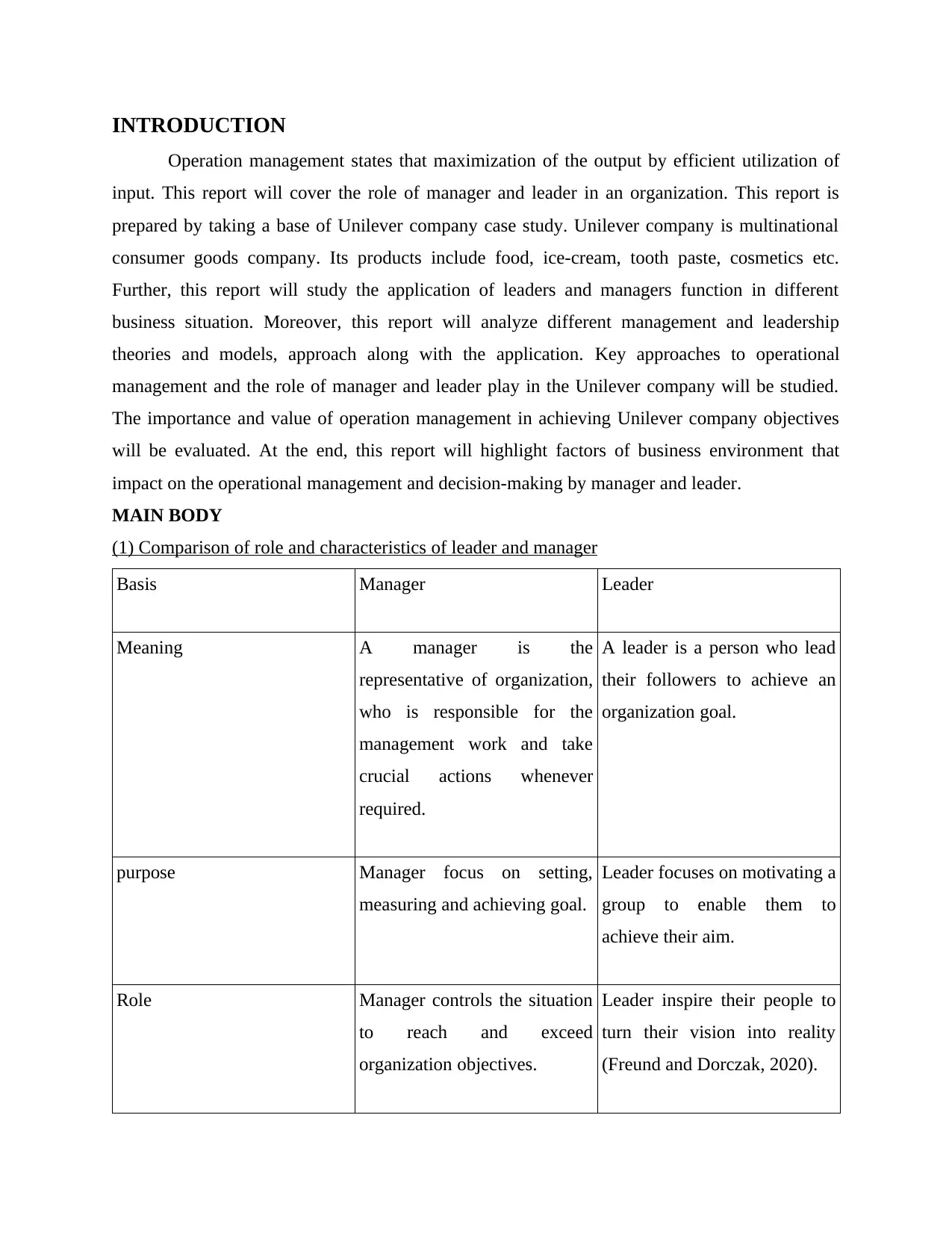
INTRODUCTION
Operation management states that maximization of the output by efficient utilization of
input. This report will cover the role of manager and leader in an organization. This report is
prepared by taking a base of Unilever company case study. Unilever company is multinational
consumer goods company. Its products include food, ice-cream, tooth paste, cosmetics etc.
Further, this report will study the application of leaders and managers function in different
business situation. Moreover, this report will analyze different management and leadership
theories and models, approach along with the application. Key approaches to operational
management and the role of manager and leader play in the Unilever company will be studied.
The importance and value of operation management in achieving Unilever company objectives
will be evaluated. At the end, this report will highlight factors of business environment that
impact on the operational management and decision-making by manager and leader.
MAIN BODY
(1) Comparison of role and characteristics of leader and manager
Basis Manager Leader
Meaning A manager is the
representative of organization,
who is responsible for the
management work and take
crucial actions whenever
required.
A leader is a person who lead
their followers to achieve an
organization goal.
purpose Manager focus on setting,
measuring and achieving goal.
Leader focuses on motivating a
group to enable them to
achieve their aim.
Role Manager controls the situation
to reach and exceed
organization objectives.
Leader inspire their people to
turn their vision into reality
(Freund and Dorczak, 2020).
Operation management states that maximization of the output by efficient utilization of
input. This report will cover the role of manager and leader in an organization. This report is
prepared by taking a base of Unilever company case study. Unilever company is multinational
consumer goods company. Its products include food, ice-cream, tooth paste, cosmetics etc.
Further, this report will study the application of leaders and managers function in different
business situation. Moreover, this report will analyze different management and leadership
theories and models, approach along with the application. Key approaches to operational
management and the role of manager and leader play in the Unilever company will be studied.
The importance and value of operation management in achieving Unilever company objectives
will be evaluated. At the end, this report will highlight factors of business environment that
impact on the operational management and decision-making by manager and leader.
MAIN BODY
(1) Comparison of role and characteristics of leader and manager
Basis Manager Leader
Meaning A manager is the
representative of organization,
who is responsible for the
management work and take
crucial actions whenever
required.
A leader is a person who lead
their followers to achieve an
organization goal.
purpose Manager focus on setting,
measuring and achieving goal.
Leader focuses on motivating a
group to enable them to
achieve their aim.
Role Manager controls the situation
to reach and exceed
organization objectives.
Leader inspire their people to
turn their vision into reality
(Freund and Dorczak, 2020).
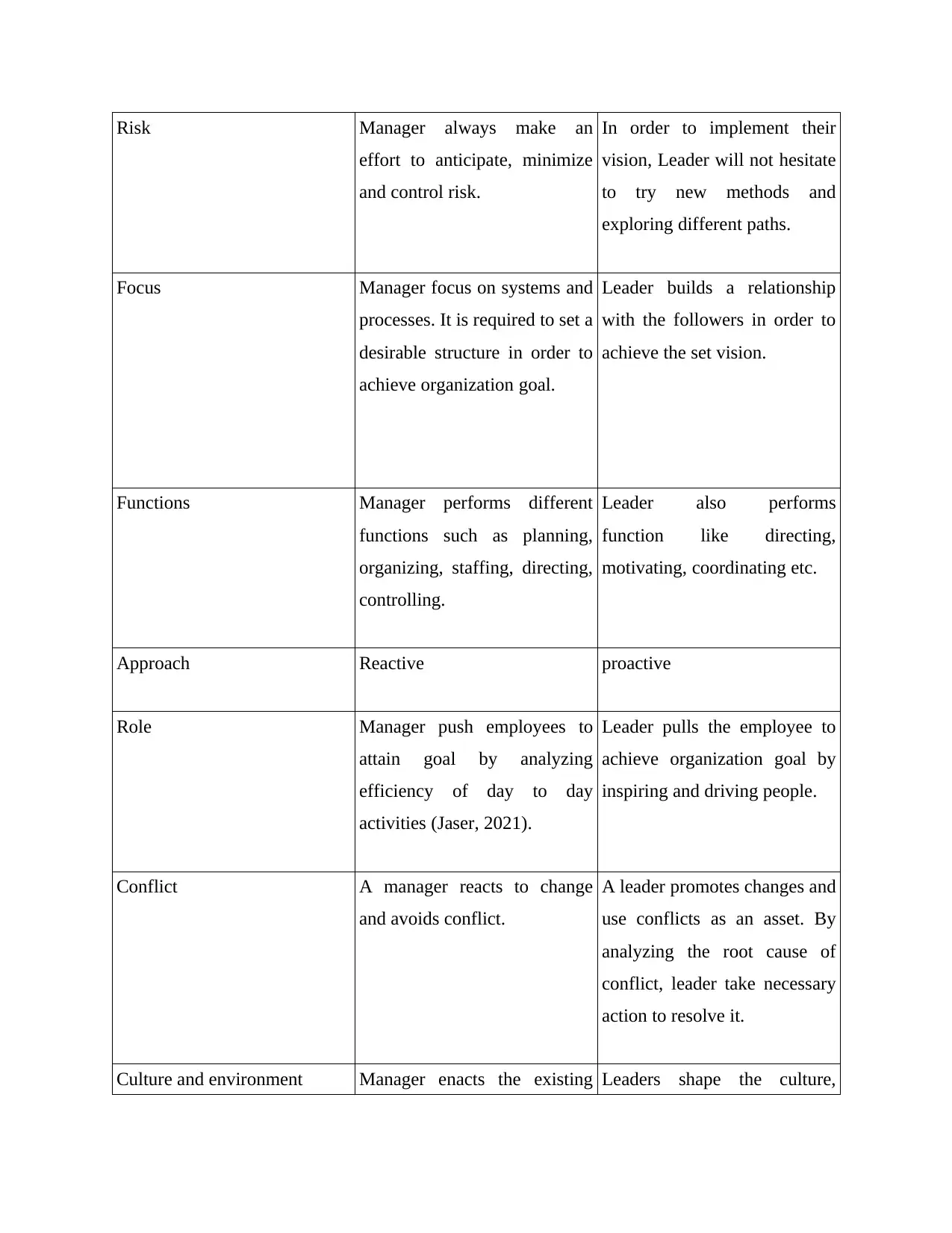
Risk Manager always make an
effort to anticipate, minimize
and control risk.
In order to implement their
vision, Leader will not hesitate
to try new methods and
exploring different paths.
Focus Manager focus on systems and
processes. It is required to set a
desirable structure in order to
achieve organization goal.
Leader builds a relationship
with the followers in order to
achieve the set vision.
Functions Manager performs different
functions such as planning,
organizing, staffing, directing,
controlling.
Leader also performs
function like directing,
motivating, coordinating etc.
Approach Reactive proactive
Role Manager push employees to
attain goal by analyzing
efficiency of day to day
activities (Jaser, 2021).
Leader pulls the employee to
achieve organization goal by
inspiring and driving people.
Conflict A manager reacts to change
and avoids conflict.
A leader promotes changes and
use conflicts as an asset. By
analyzing the root cause of
conflict, leader take necessary
action to resolve it.
Culture and environment Manager enacts the existing Leaders shape the culture,
effort to anticipate, minimize
and control risk.
In order to implement their
vision, Leader will not hesitate
to try new methods and
exploring different paths.
Focus Manager focus on systems and
processes. It is required to set a
desirable structure in order to
achieve organization goal.
Leader builds a relationship
with the followers in order to
achieve the set vision.
Functions Manager performs different
functions such as planning,
organizing, staffing, directing,
controlling.
Leader also performs
function like directing,
motivating, coordinating etc.
Approach Reactive proactive
Role Manager push employees to
attain goal by analyzing
efficiency of day to day
activities (Jaser, 2021).
Leader pulls the employee to
achieve organization goal by
inspiring and driving people.
Conflict A manager reacts to change
and avoids conflict.
A leader promotes changes and
use conflicts as an asset. By
analyzing the root cause of
conflict, leader take necessary
action to resolve it.
Culture and environment Manager enacts the existing Leaders shape the culture,
Secure Best Marks with AI Grader
Need help grading? Try our AI Grader for instant feedback on your assignments.
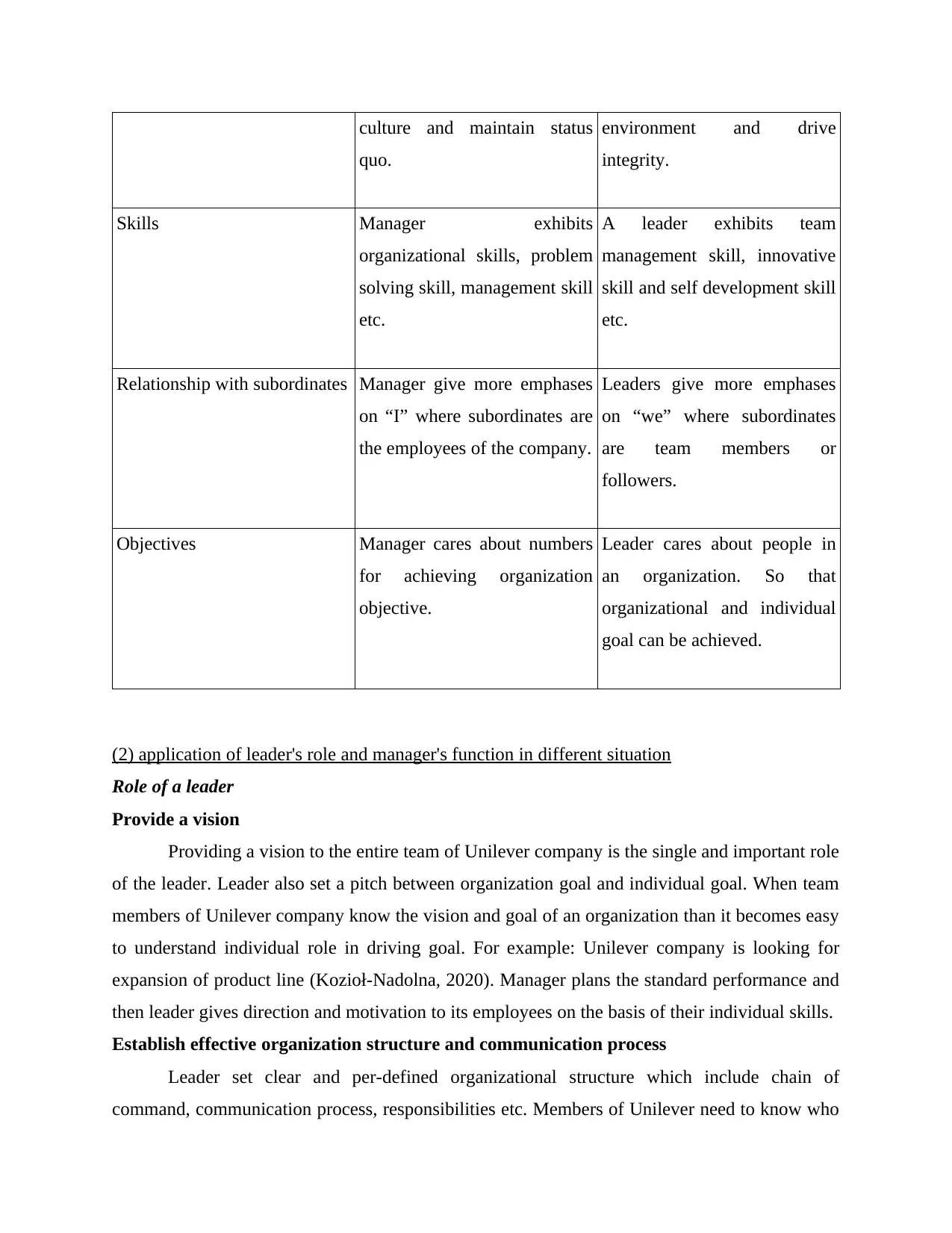
culture and maintain status
quo.
environment and drive
integrity.
Skills Manager exhibits
organizational skills, problem
solving skill, management skill
etc.
A leader exhibits team
management skill, innovative
skill and self development skill
etc.
Relationship with subordinates Manager give more emphases
on “I” where subordinates are
the employees of the company.
Leaders give more emphases
on “we” where subordinates
are team members or
followers.
Objectives Manager cares about numbers
for achieving organization
objective.
Leader cares about people in
an organization. So that
organizational and individual
goal can be achieved.
(2) application of leader's role and manager's function in different situation
Role of a leader
Provide a vision
Providing a vision to the entire team of Unilever company is the single and important role
of the leader. Leader also set a pitch between organization goal and individual goal. When team
members of Unilever company know the vision and goal of an organization than it becomes easy
to understand individual role in driving goal. For example: Unilever company is looking for
expansion of product line (Kozioł-Nadolna, 2020). Manager plans the standard performance and
then leader gives direction and motivation to its employees on the basis of their individual skills.
Establish effective organization structure and communication process
Leader set clear and per-defined organizational structure which include chain of
command, communication process, responsibilities etc. Members of Unilever need to know who
quo.
environment and drive
integrity.
Skills Manager exhibits
organizational skills, problem
solving skill, management skill
etc.
A leader exhibits team
management skill, innovative
skill and self development skill
etc.
Relationship with subordinates Manager give more emphases
on “I” where subordinates are
the employees of the company.
Leaders give more emphases
on “we” where subordinates
are team members or
followers.
Objectives Manager cares about numbers
for achieving organization
objective.
Leader cares about people in
an organization. So that
organizational and individual
goal can be achieved.
(2) application of leader's role and manager's function in different situation
Role of a leader
Provide a vision
Providing a vision to the entire team of Unilever company is the single and important role
of the leader. Leader also set a pitch between organization goal and individual goal. When team
members of Unilever company know the vision and goal of an organization than it becomes easy
to understand individual role in driving goal. For example: Unilever company is looking for
expansion of product line (Kozioł-Nadolna, 2020). Manager plans the standard performance and
then leader gives direction and motivation to its employees on the basis of their individual skills.
Establish effective organization structure and communication process
Leader set clear and per-defined organizational structure which include chain of
command, communication process, responsibilities etc. Members of Unilever need to know who
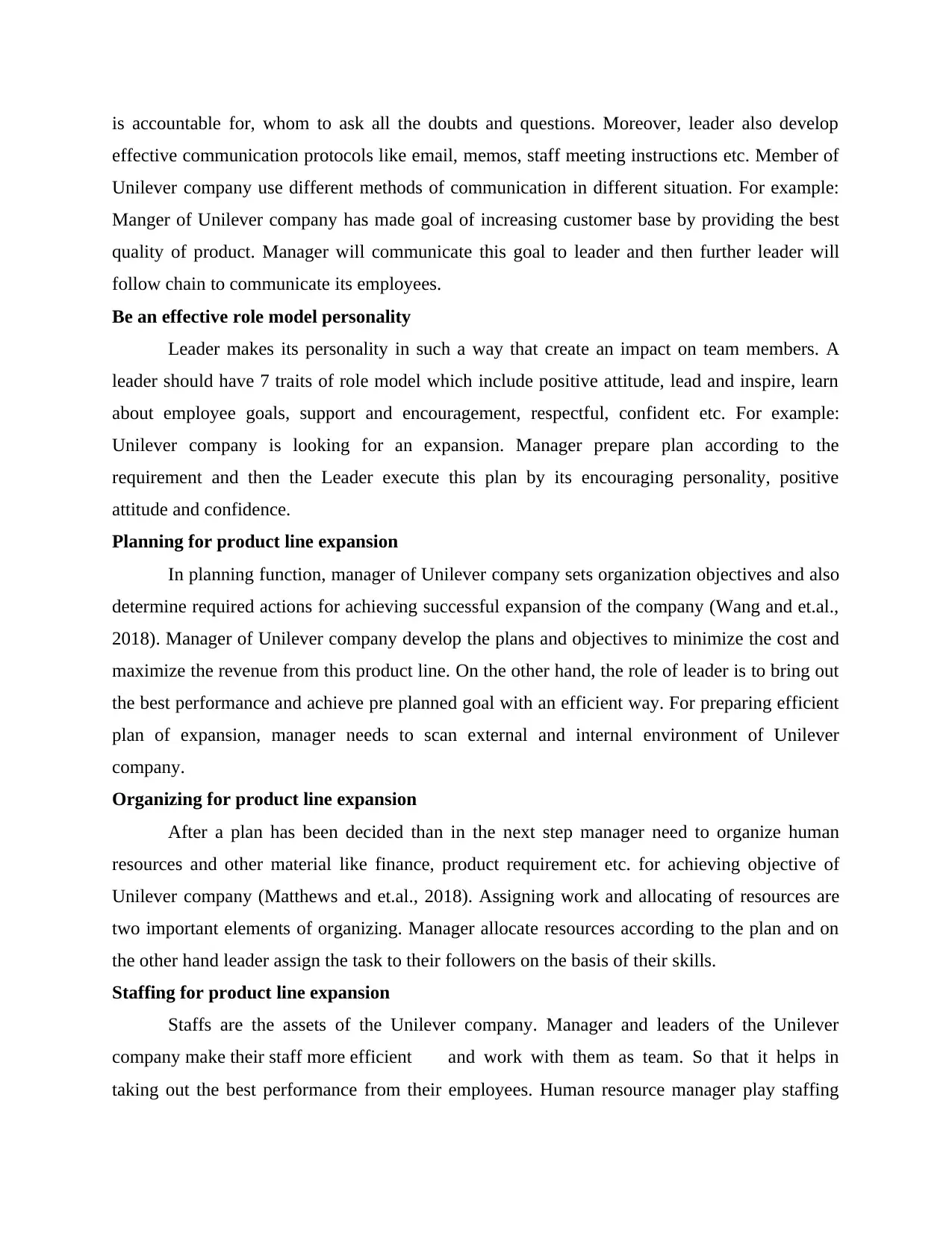
is accountable for, whom to ask all the doubts and questions. Moreover, leader also develop
effective communication protocols like email, memos, staff meeting instructions etc. Member of
Unilever company use different methods of communication in different situation. For example:
Manger of Unilever company has made goal of increasing customer base by providing the best
quality of product. Manager will communicate this goal to leader and then further leader will
follow chain to communicate its employees.
Be an effective role model personality
Leader makes its personality in such a way that create an impact on team members. A
leader should have 7 traits of role model which include positive attitude, lead and inspire, learn
about employee goals, support and encouragement, respectful, confident etc. For example:
Unilever company is looking for an expansion. Manager prepare plan according to the
requirement and then the Leader execute this plan by its encouraging personality, positive
attitude and confidence.
Planning for product line expansion
In planning function, manager of Unilever company sets organization objectives and also
determine required actions for achieving successful expansion of the company (Wang and et.al.,
2018). Manager of Unilever company develop the plans and objectives to minimize the cost and
maximize the revenue from this product line. On the other hand, the role of leader is to bring out
the best performance and achieve pre planned goal with an efficient way. For preparing efficient
plan of expansion, manager needs to scan external and internal environment of Unilever
company.
Organizing for product line expansion
After a plan has been decided than in the next step manager need to organize human
resources and other material like finance, product requirement etc. for achieving objective of
Unilever company (Matthews and et.al., 2018). Assigning work and allocating of resources are
two important elements of organizing. Manager allocate resources according to the plan and on
the other hand leader assign the task to their followers on the basis of their skills.
Staffing for product line expansion
Staffs are the assets of the Unilever company. Manager and leaders of the Unilever
company make their staff more efficient and work with them as team. So that it helps in
taking out the best performance from their employees. Human resource manager play staffing
effective communication protocols like email, memos, staff meeting instructions etc. Member of
Unilever company use different methods of communication in different situation. For example:
Manger of Unilever company has made goal of increasing customer base by providing the best
quality of product. Manager will communicate this goal to leader and then further leader will
follow chain to communicate its employees.
Be an effective role model personality
Leader makes its personality in such a way that create an impact on team members. A
leader should have 7 traits of role model which include positive attitude, lead and inspire, learn
about employee goals, support and encouragement, respectful, confident etc. For example:
Unilever company is looking for an expansion. Manager prepare plan according to the
requirement and then the Leader execute this plan by its encouraging personality, positive
attitude and confidence.
Planning for product line expansion
In planning function, manager of Unilever company sets organization objectives and also
determine required actions for achieving successful expansion of the company (Wang and et.al.,
2018). Manager of Unilever company develop the plans and objectives to minimize the cost and
maximize the revenue from this product line. On the other hand, the role of leader is to bring out
the best performance and achieve pre planned goal with an efficient way. For preparing efficient
plan of expansion, manager needs to scan external and internal environment of Unilever
company.
Organizing for product line expansion
After a plan has been decided than in the next step manager need to organize human
resources and other material like finance, product requirement etc. for achieving objective of
Unilever company (Matthews and et.al., 2018). Assigning work and allocating of resources are
two important elements of organizing. Manager allocate resources according to the plan and on
the other hand leader assign the task to their followers on the basis of their skills.
Staffing for product line expansion
Staffs are the assets of the Unilever company. Manager and leaders of the Unilever
company make their staff more efficient and work with them as team. So that it helps in
taking out the best performance from their employees. Human resource manager play staffing
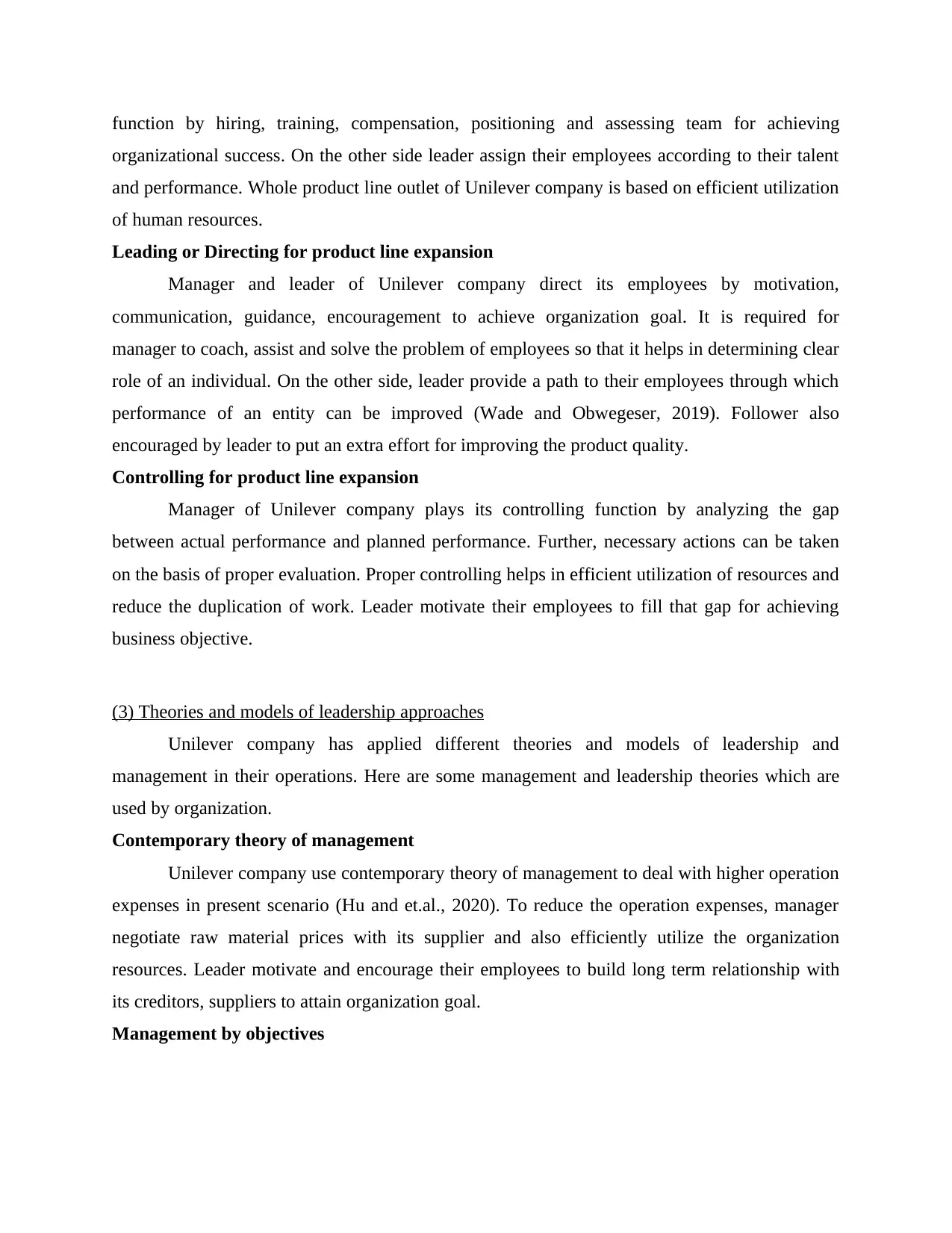
function by hiring, training, compensation, positioning and assessing team for achieving
organizational success. On the other side leader assign their employees according to their talent
and performance. Whole product line outlet of Unilever company is based on efficient utilization
of human resources.
Leading or Directing for product line expansion
Manager and leader of Unilever company direct its employees by motivation,
communication, guidance, encouragement to achieve organization goal. It is required for
manager to coach, assist and solve the problem of employees so that it helps in determining clear
role of an individual. On the other side, leader provide a path to their employees through which
performance of an entity can be improved (Wade and Obwegeser, 2019). Follower also
encouraged by leader to put an extra effort for improving the product quality.
Controlling for product line expansion
Manager of Unilever company plays its controlling function by analyzing the gap
between actual performance and planned performance. Further, necessary actions can be taken
on the basis of proper evaluation. Proper controlling helps in efficient utilization of resources and
reduce the duplication of work. Leader motivate their employees to fill that gap for achieving
business objective.
(3) Theories and models of leadership approaches
Unilever company has applied different theories and models of leadership and
management in their operations. Here are some management and leadership theories which are
used by organization.
Contemporary theory of management
Unilever company use contemporary theory of management to deal with higher operation
expenses in present scenario (Hu and et.al., 2020). To reduce the operation expenses, manager
negotiate raw material prices with its supplier and also efficiently utilize the organization
resources. Leader motivate and encourage their employees to build long term relationship with
its creditors, suppliers to attain organization goal.
Management by objectives
organizational success. On the other side leader assign their employees according to their talent
and performance. Whole product line outlet of Unilever company is based on efficient utilization
of human resources.
Leading or Directing for product line expansion
Manager and leader of Unilever company direct its employees by motivation,
communication, guidance, encouragement to achieve organization goal. It is required for
manager to coach, assist and solve the problem of employees so that it helps in determining clear
role of an individual. On the other side, leader provide a path to their employees through which
performance of an entity can be improved (Wade and Obwegeser, 2019). Follower also
encouraged by leader to put an extra effort for improving the product quality.
Controlling for product line expansion
Manager of Unilever company plays its controlling function by analyzing the gap
between actual performance and planned performance. Further, necessary actions can be taken
on the basis of proper evaluation. Proper controlling helps in efficient utilization of resources and
reduce the duplication of work. Leader motivate their employees to fill that gap for achieving
business objective.
(3) Theories and models of leadership approaches
Unilever company has applied different theories and models of leadership and
management in their operations. Here are some management and leadership theories which are
used by organization.
Contemporary theory of management
Unilever company use contemporary theory of management to deal with higher operation
expenses in present scenario (Hu and et.al., 2020). To reduce the operation expenses, manager
negotiate raw material prices with its supplier and also efficiently utilize the organization
resources. Leader motivate and encourage their employees to build long term relationship with
its creditors, suppliers to attain organization goal.
Management by objectives
Paraphrase This Document
Need a fresh take? Get an instant paraphrase of this document with our AI Paraphraser
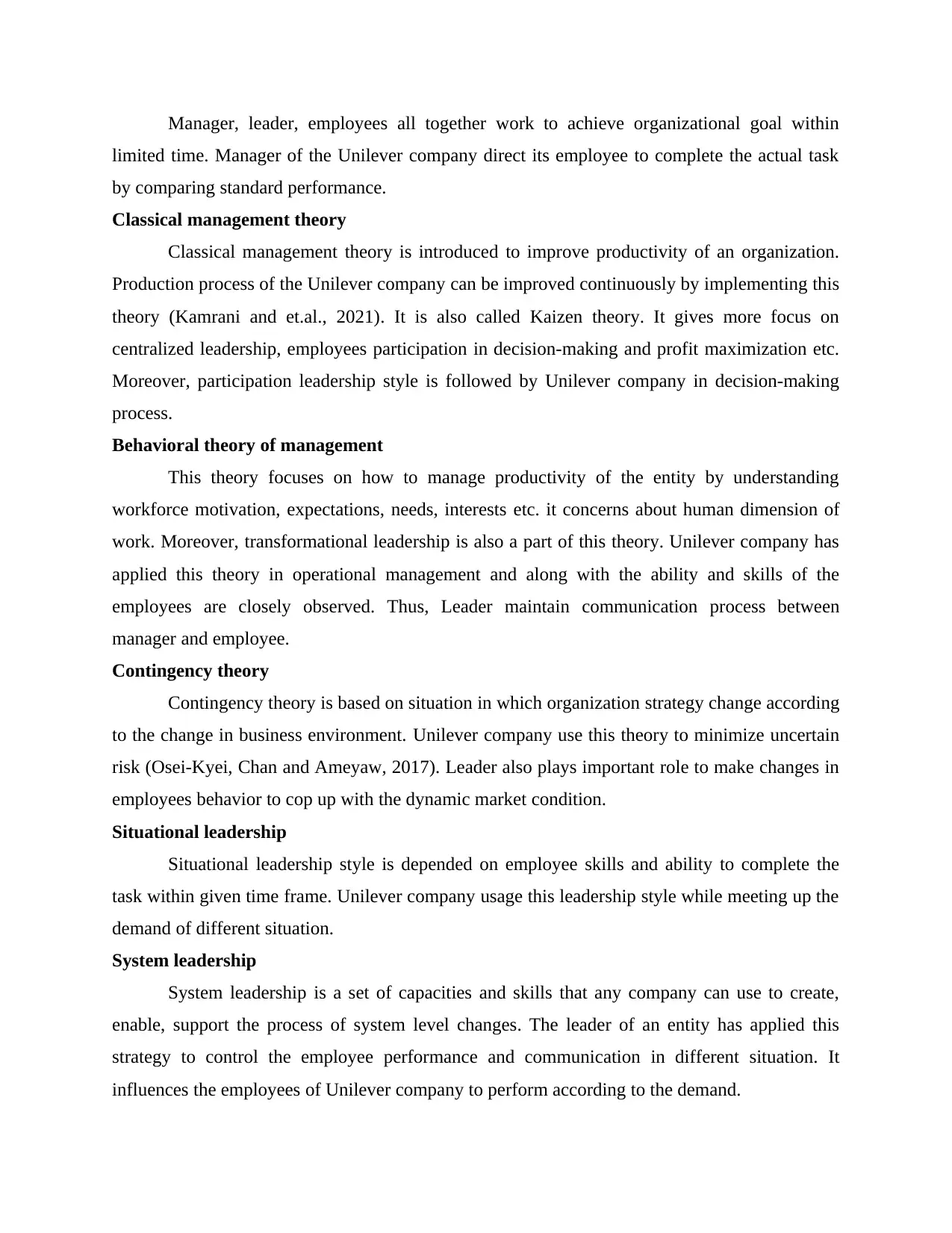
Manager, leader, employees all together work to achieve organizational goal within
limited time. Manager of the Unilever company direct its employee to complete the actual task
by comparing standard performance.
Classical management theory
Classical management theory is introduced to improve productivity of an organization.
Production process of the Unilever company can be improved continuously by implementing this
theory (Kamrani and et.al., 2021). It is also called Kaizen theory. It gives more focus on
centralized leadership, employees participation in decision-making and profit maximization etc.
Moreover, participation leadership style is followed by Unilever company in decision-making
process.
Behavioral theory of management
This theory focuses on how to manage productivity of the entity by understanding
workforce motivation, expectations, needs, interests etc. it concerns about human dimension of
work. Moreover, transformational leadership is also a part of this theory. Unilever company has
applied this theory in operational management and along with the ability and skills of the
employees are closely observed. Thus, Leader maintain communication process between
manager and employee.
Contingency theory
Contingency theory is based on situation in which organization strategy change according
to the change in business environment. Unilever company use this theory to minimize uncertain
risk (Osei-Kyei, Chan and Ameyaw, 2017). Leader also plays important role to make changes in
employees behavior to cop up with the dynamic market condition.
Situational leadership
Situational leadership style is depended on employee skills and ability to complete the
task within given time frame. Unilever company usage this leadership style while meeting up the
demand of different situation.
System leadership
System leadership is a set of capacities and skills that any company can use to create,
enable, support the process of system level changes. The leader of an entity has applied this
strategy to control the employee performance and communication in different situation. It
influences the employees of Unilever company to perform according to the demand.
limited time. Manager of the Unilever company direct its employee to complete the actual task
by comparing standard performance.
Classical management theory
Classical management theory is introduced to improve productivity of an organization.
Production process of the Unilever company can be improved continuously by implementing this
theory (Kamrani and et.al., 2021). It is also called Kaizen theory. It gives more focus on
centralized leadership, employees participation in decision-making and profit maximization etc.
Moreover, participation leadership style is followed by Unilever company in decision-making
process.
Behavioral theory of management
This theory focuses on how to manage productivity of the entity by understanding
workforce motivation, expectations, needs, interests etc. it concerns about human dimension of
work. Moreover, transformational leadership is also a part of this theory. Unilever company has
applied this theory in operational management and along with the ability and skills of the
employees are closely observed. Thus, Leader maintain communication process between
manager and employee.
Contingency theory
Contingency theory is based on situation in which organization strategy change according
to the change in business environment. Unilever company use this theory to minimize uncertain
risk (Osei-Kyei, Chan and Ameyaw, 2017). Leader also plays important role to make changes in
employees behavior to cop up with the dynamic market condition.
Situational leadership
Situational leadership style is depended on employee skills and ability to complete the
task within given time frame. Unilever company usage this leadership style while meeting up the
demand of different situation.
System leadership
System leadership is a set of capacities and skills that any company can use to create,
enable, support the process of system level changes. The leader of an entity has applied this
strategy to control the employee performance and communication in different situation. It
influences the employees of Unilever company to perform according to the demand.
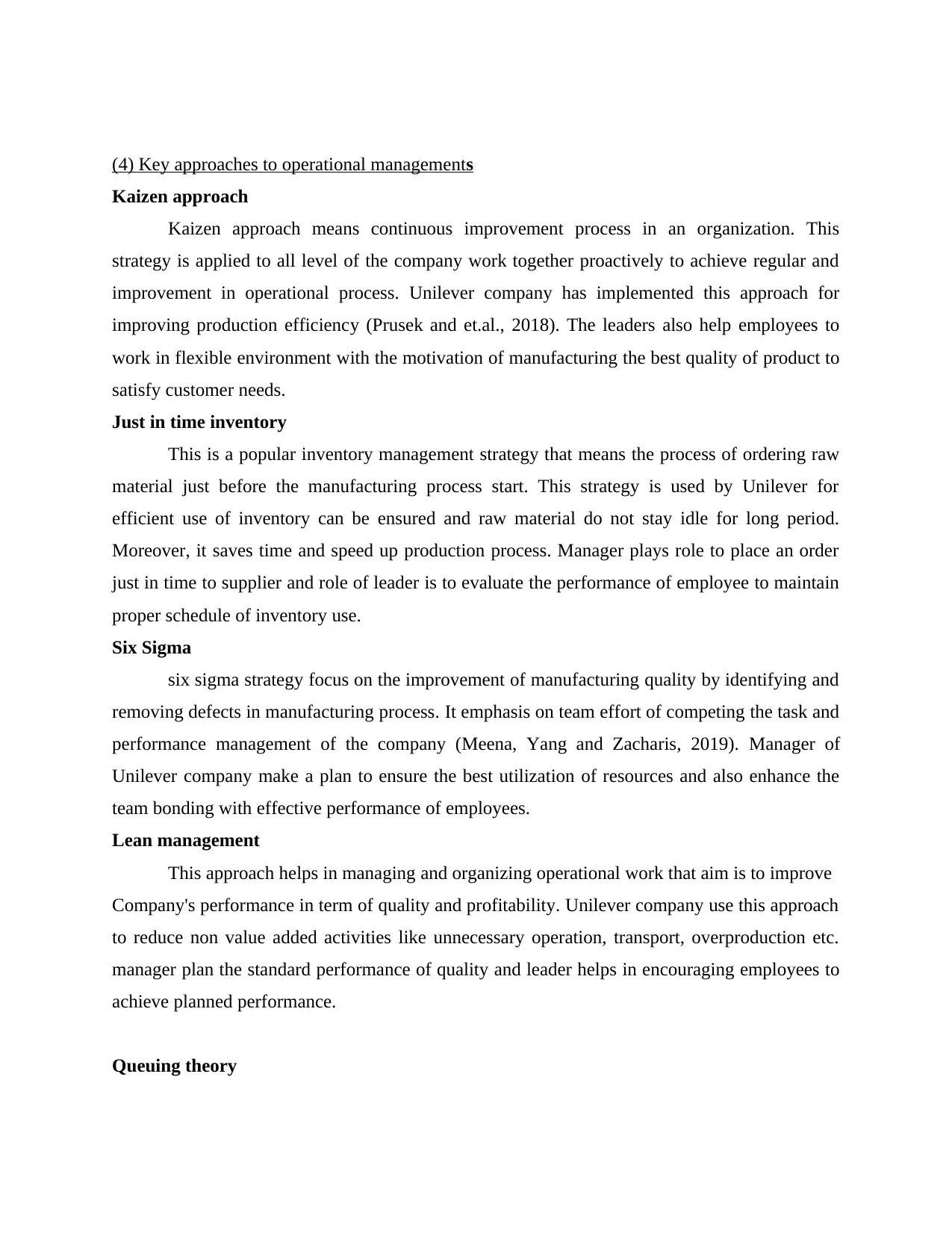
(4) Key approaches to operational managements
Kaizen approach
Kaizen approach means continuous improvement process in an organization. This
strategy is applied to all level of the company work together proactively to achieve regular and
improvement in operational process. Unilever company has implemented this approach for
improving production efficiency (Prusek and et.al., 2018). The leaders also help employees to
work in flexible environment with the motivation of manufacturing the best quality of product to
satisfy customer needs.
Just in time inventory
This is a popular inventory management strategy that means the process of ordering raw
material just before the manufacturing process start. This strategy is used by Unilever for
efficient use of inventory can be ensured and raw material do not stay idle for long period.
Moreover, it saves time and speed up production process. Manager plays role to place an order
just in time to supplier and role of leader is to evaluate the performance of employee to maintain
proper schedule of inventory use.
Six Sigma
six sigma strategy focus on the improvement of manufacturing quality by identifying and
removing defects in manufacturing process. It emphasis on team effort of competing the task and
performance management of the company (Meena, Yang and Zacharis, 2019). Manager of
Unilever company make a plan to ensure the best utilization of resources and also enhance the
team bonding with effective performance of employees.
Lean management
This approach helps in managing and organizing operational work that aim is to improve
Company's performance in term of quality and profitability. Unilever company use this approach
to reduce non value added activities like unnecessary operation, transport, overproduction etc.
manager plan the standard performance of quality and leader helps in encouraging employees to
achieve planned performance.
Queuing theory
Kaizen approach
Kaizen approach means continuous improvement process in an organization. This
strategy is applied to all level of the company work together proactively to achieve regular and
improvement in operational process. Unilever company has implemented this approach for
improving production efficiency (Prusek and et.al., 2018). The leaders also help employees to
work in flexible environment with the motivation of manufacturing the best quality of product to
satisfy customer needs.
Just in time inventory
This is a popular inventory management strategy that means the process of ordering raw
material just before the manufacturing process start. This strategy is used by Unilever for
efficient use of inventory can be ensured and raw material do not stay idle for long period.
Moreover, it saves time and speed up production process. Manager plays role to place an order
just in time to supplier and role of leader is to evaluate the performance of employee to maintain
proper schedule of inventory use.
Six Sigma
six sigma strategy focus on the improvement of manufacturing quality by identifying and
removing defects in manufacturing process. It emphasis on team effort of competing the task and
performance management of the company (Meena, Yang and Zacharis, 2019). Manager of
Unilever company make a plan to ensure the best utilization of resources and also enhance the
team bonding with effective performance of employees.
Lean management
This approach helps in managing and organizing operational work that aim is to improve
Company's performance in term of quality and profitability. Unilever company use this approach
to reduce non value added activities like unnecessary operation, transport, overproduction etc.
manager plan the standard performance of quality and leader helps in encouraging employees to
achieve planned performance.
Queuing theory
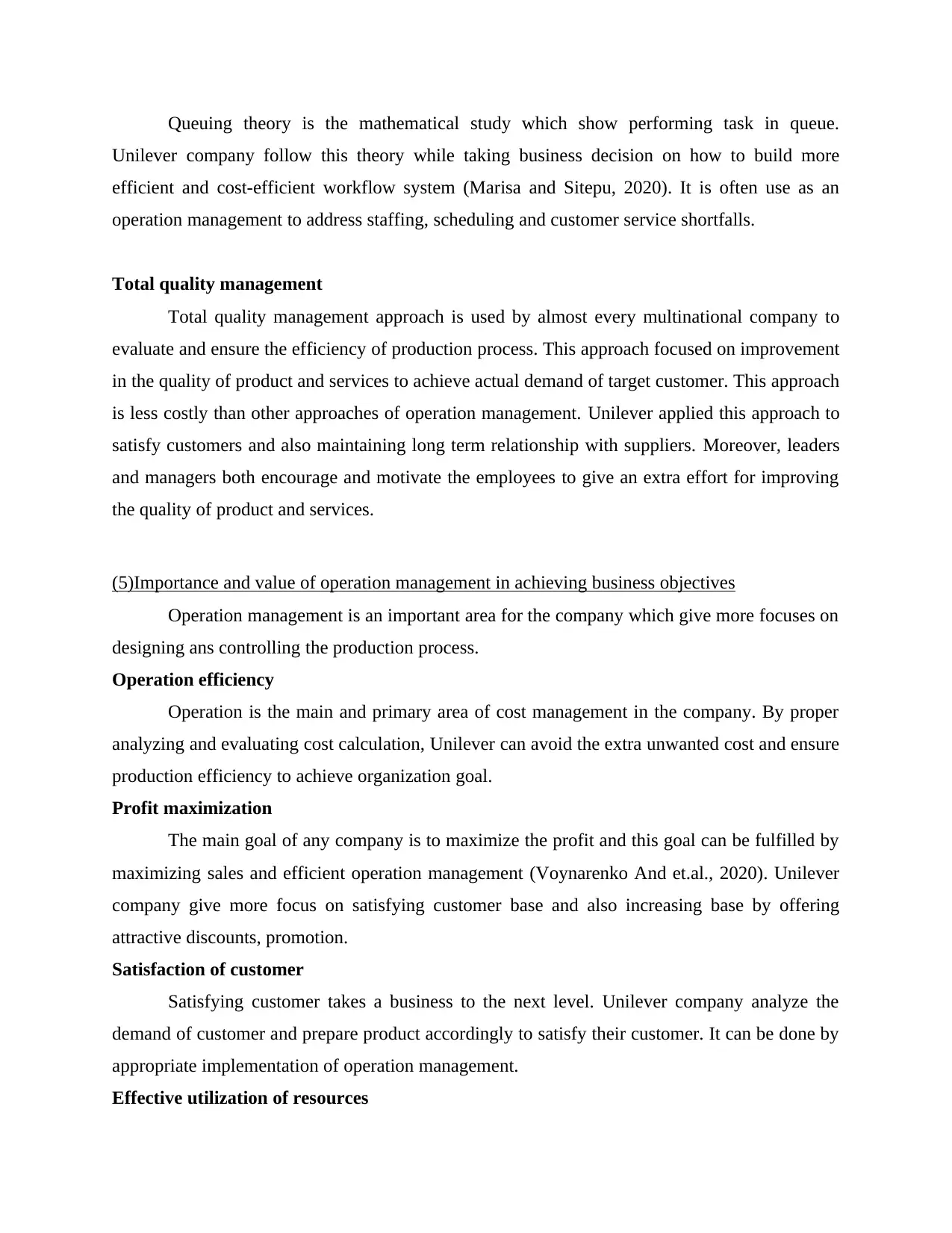
Queuing theory is the mathematical study which show performing task in queue.
Unilever company follow this theory while taking business decision on how to build more
efficient and cost-efficient workflow system (Marisa and Sitepu, 2020). It is often use as an
operation management to address staffing, scheduling and customer service shortfalls.
Total quality management
Total quality management approach is used by almost every multinational company to
evaluate and ensure the efficiency of production process. This approach focused on improvement
in the quality of product and services to achieve actual demand of target customer. This approach
is less costly than other approaches of operation management. Unilever applied this approach to
satisfy customers and also maintaining long term relationship with suppliers. Moreover, leaders
and managers both encourage and motivate the employees to give an extra effort for improving
the quality of product and services.
(5)Importance and value of operation management in achieving business objectives
Operation management is an important area for the company which give more focuses on
designing ans controlling the production process.
Operation efficiency
Operation is the main and primary area of cost management in the company. By proper
analyzing and evaluating cost calculation, Unilever can avoid the extra unwanted cost and ensure
production efficiency to achieve organization goal.
Profit maximization
The main goal of any company is to maximize the profit and this goal can be fulfilled by
maximizing sales and efficient operation management (Voynarenko And et.al., 2020). Unilever
company give more focus on satisfying customer base and also increasing base by offering
attractive discounts, promotion.
Satisfaction of customer
Satisfying customer takes a business to the next level. Unilever company analyze the
demand of customer and prepare product accordingly to satisfy their customer. It can be done by
appropriate implementation of operation management.
Effective utilization of resources
Unilever company follow this theory while taking business decision on how to build more
efficient and cost-efficient workflow system (Marisa and Sitepu, 2020). It is often use as an
operation management to address staffing, scheduling and customer service shortfalls.
Total quality management
Total quality management approach is used by almost every multinational company to
evaluate and ensure the efficiency of production process. This approach focused on improvement
in the quality of product and services to achieve actual demand of target customer. This approach
is less costly than other approaches of operation management. Unilever applied this approach to
satisfy customers and also maintaining long term relationship with suppliers. Moreover, leaders
and managers both encourage and motivate the employees to give an extra effort for improving
the quality of product and services.
(5)Importance and value of operation management in achieving business objectives
Operation management is an important area for the company which give more focuses on
designing ans controlling the production process.
Operation efficiency
Operation is the main and primary area of cost management in the company. By proper
analyzing and evaluating cost calculation, Unilever can avoid the extra unwanted cost and ensure
production efficiency to achieve organization goal.
Profit maximization
The main goal of any company is to maximize the profit and this goal can be fulfilled by
maximizing sales and efficient operation management (Voynarenko And et.al., 2020). Unilever
company give more focus on satisfying customer base and also increasing base by offering
attractive discounts, promotion.
Satisfaction of customer
Satisfying customer takes a business to the next level. Unilever company analyze the
demand of customer and prepare product accordingly to satisfy their customer. It can be done by
appropriate implementation of operation management.
Effective utilization of resources
Secure Best Marks with AI Grader
Need help grading? Try our AI Grader for instant feedback on your assignments.
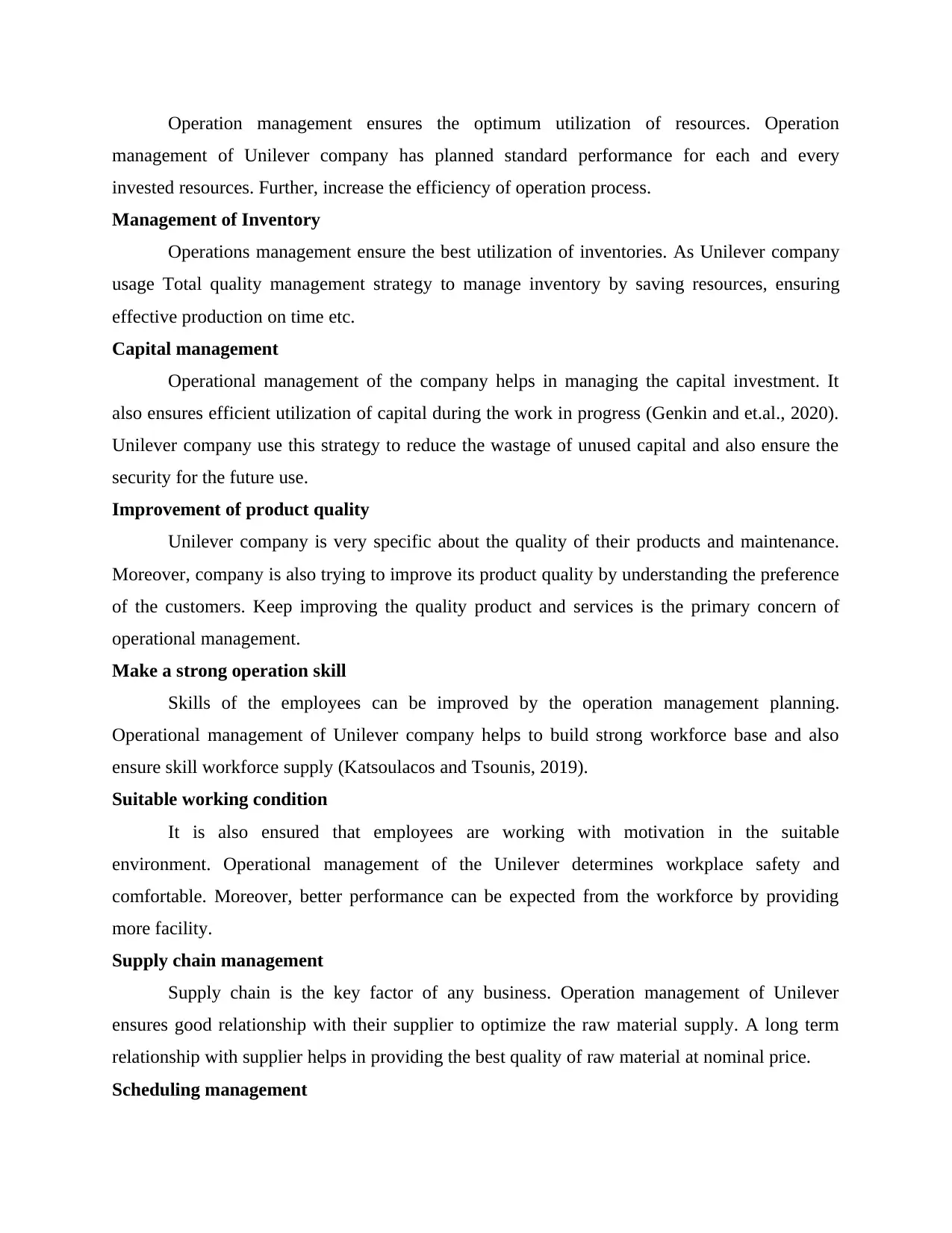
Operation management ensures the optimum utilization of resources. Operation
management of Unilever company has planned standard performance for each and every
invested resources. Further, increase the efficiency of operation process.
Management of Inventory
Operations management ensure the best utilization of inventories. As Unilever company
usage Total quality management strategy to manage inventory by saving resources, ensuring
effective production on time etc.
Capital management
Operational management of the company helps in managing the capital investment. It
also ensures efficient utilization of capital during the work in progress (Genkin and et.al., 2020).
Unilever company use this strategy to reduce the wastage of unused capital and also ensure the
security for the future use.
Improvement of product quality
Unilever company is very specific about the quality of their products and maintenance.
Moreover, company is also trying to improve its product quality by understanding the preference
of the customers. Keep improving the quality product and services is the primary concern of
operational management.
Make a strong operation skill
Skills of the employees can be improved by the operation management planning.
Operational management of Unilever company helps to build strong workforce base and also
ensure skill workforce supply (Katsoulacos and Tsounis, 2019).
Suitable working condition
It is also ensured that employees are working with motivation in the suitable
environment. Operational management of the Unilever determines workplace safety and
comfortable. Moreover, better performance can be expected from the workforce by providing
more facility.
Supply chain management
Supply chain is the key factor of any business. Operation management of Unilever
ensures good relationship with their supplier to optimize the raw material supply. A long term
relationship with supplier helps in providing the best quality of raw material at nominal price.
Scheduling management
management of Unilever company has planned standard performance for each and every
invested resources. Further, increase the efficiency of operation process.
Management of Inventory
Operations management ensure the best utilization of inventories. As Unilever company
usage Total quality management strategy to manage inventory by saving resources, ensuring
effective production on time etc.
Capital management
Operational management of the company helps in managing the capital investment. It
also ensures efficient utilization of capital during the work in progress (Genkin and et.al., 2020).
Unilever company use this strategy to reduce the wastage of unused capital and also ensure the
security for the future use.
Improvement of product quality
Unilever company is very specific about the quality of their products and maintenance.
Moreover, company is also trying to improve its product quality by understanding the preference
of the customers. Keep improving the quality product and services is the primary concern of
operational management.
Make a strong operation skill
Skills of the employees can be improved by the operation management planning.
Operational management of Unilever company helps to build strong workforce base and also
ensure skill workforce supply (Katsoulacos and Tsounis, 2019).
Suitable working condition
It is also ensured that employees are working with motivation in the suitable
environment. Operational management of the Unilever determines workplace safety and
comfortable. Moreover, better performance can be expected from the workforce by providing
more facility.
Supply chain management
Supply chain is the key factor of any business. Operation management of Unilever
ensures good relationship with their supplier to optimize the raw material supply. A long term
relationship with supplier helps in providing the best quality of raw material at nominal price.
Scheduling management
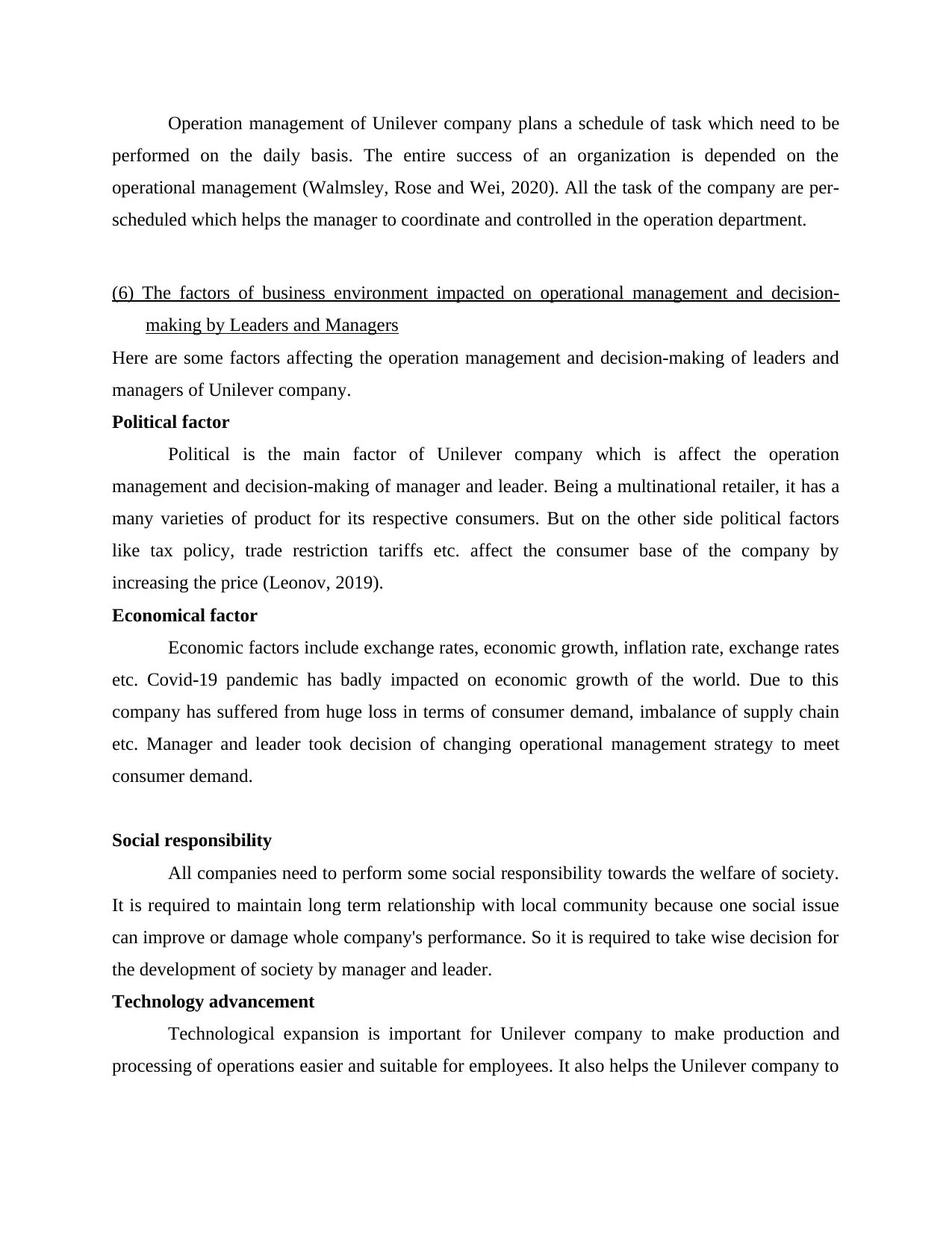
Operation management of Unilever company plans a schedule of task which need to be
performed on the daily basis. The entire success of an organization is depended on the
operational management (Walmsley, Rose and Wei, 2020). All the task of the company are per-
scheduled which helps the manager to coordinate and controlled in the operation department.
(6) The factors of business environment impacted on operational management and decision-
making by Leaders and Managers
Here are some factors affecting the operation management and decision-making of leaders and
managers of Unilever company.
Political factor
Political is the main factor of Unilever company which is affect the operation
management and decision-making of manager and leader. Being a multinational retailer, it has a
many varieties of product for its respective consumers. But on the other side political factors
like tax policy, trade restriction tariffs etc. affect the consumer base of the company by
increasing the price (Leonov, 2019).
Economical factor
Economic factors include exchange rates, economic growth, inflation rate, exchange rates
etc. Covid-19 pandemic has badly impacted on economic growth of the world. Due to this
company has suffered from huge loss in terms of consumer demand, imbalance of supply chain
etc. Manager and leader took decision of changing operational management strategy to meet
consumer demand.
Social responsibility
All companies need to perform some social responsibility towards the welfare of society.
It is required to maintain long term relationship with local community because one social issue
can improve or damage whole company's performance. So it is required to take wise decision for
the development of society by manager and leader.
Technology advancement
Technological expansion is important for Unilever company to make production and
processing of operations easier and suitable for employees. It also helps the Unilever company to
performed on the daily basis. The entire success of an organization is depended on the
operational management (Walmsley, Rose and Wei, 2020). All the task of the company are per-
scheduled which helps the manager to coordinate and controlled in the operation department.
(6) The factors of business environment impacted on operational management and decision-
making by Leaders and Managers
Here are some factors affecting the operation management and decision-making of leaders and
managers of Unilever company.
Political factor
Political is the main factor of Unilever company which is affect the operation
management and decision-making of manager and leader. Being a multinational retailer, it has a
many varieties of product for its respective consumers. But on the other side political factors
like tax policy, trade restriction tariffs etc. affect the consumer base of the company by
increasing the price (Leonov, 2019).
Economical factor
Economic factors include exchange rates, economic growth, inflation rate, exchange rates
etc. Covid-19 pandemic has badly impacted on economic growth of the world. Due to this
company has suffered from huge loss in terms of consumer demand, imbalance of supply chain
etc. Manager and leader took decision of changing operational management strategy to meet
consumer demand.
Social responsibility
All companies need to perform some social responsibility towards the welfare of society.
It is required to maintain long term relationship with local community because one social issue
can improve or damage whole company's performance. So it is required to take wise decision for
the development of society by manager and leader.
Technology advancement
Technological expansion is important for Unilever company to make production and
processing of operations easier and suitable for employees. It also helps the Unilever company to
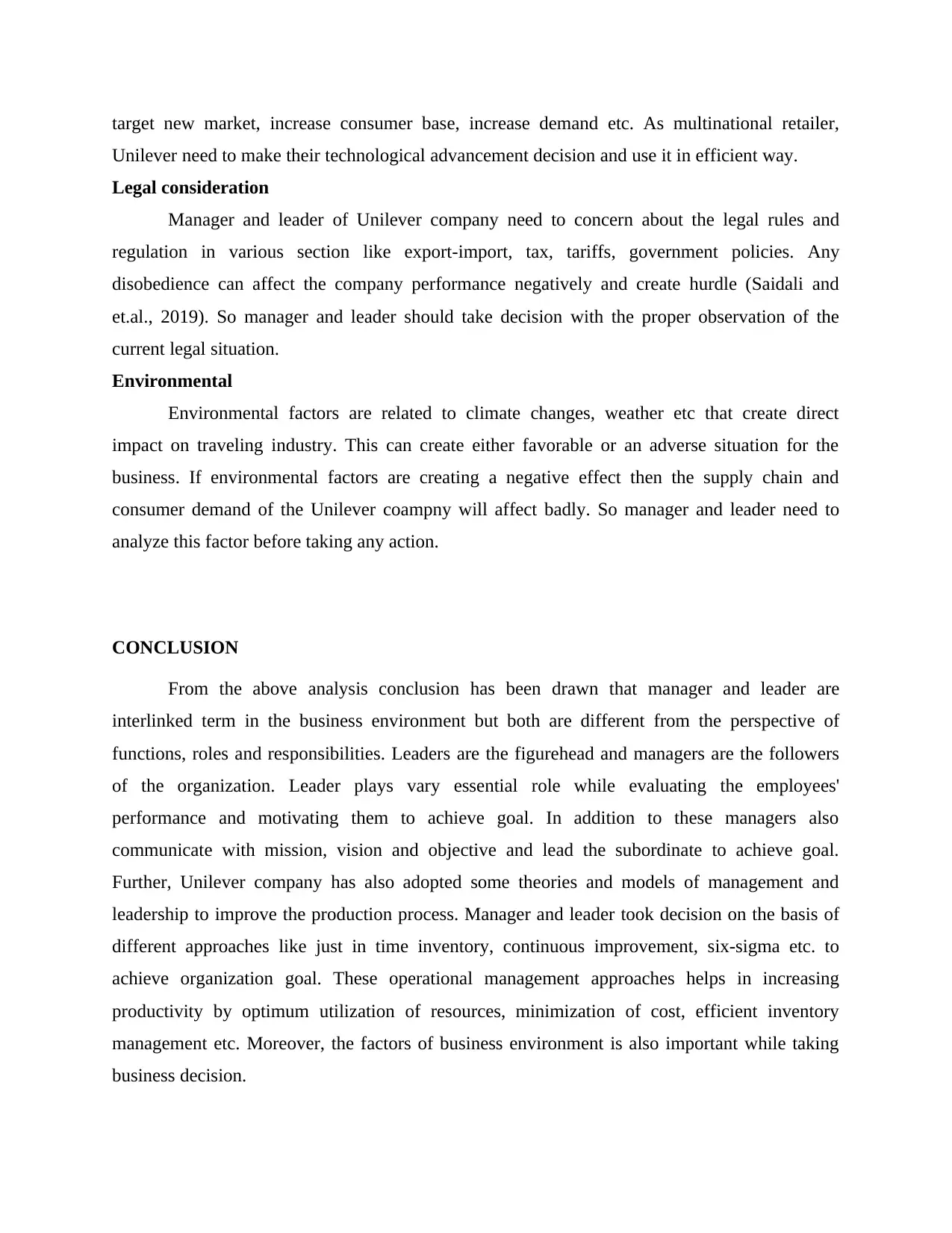
target new market, increase consumer base, increase demand etc. As multinational retailer,
Unilever need to make their technological advancement decision and use it in efficient way.
Legal consideration
Manager and leader of Unilever company need to concern about the legal rules and
regulation in various section like export-import, tax, tariffs, government policies. Any
disobedience can affect the company performance negatively and create hurdle (Saidali and
et.al., 2019). So manager and leader should take decision with the proper observation of the
current legal situation.
Environmental
Environmental factors are related to climate changes, weather etc that create direct
impact on traveling industry. This can create either favorable or an adverse situation for the
business. If environmental factors are creating a negative effect then the supply chain and
consumer demand of the Unilever coampny will affect badly. So manager and leader need to
analyze this factor before taking any action.
CONCLUSION
From the above analysis conclusion has been drawn that manager and leader are
interlinked term in the business environment but both are different from the perspective of
functions, roles and responsibilities. Leaders are the figurehead and managers are the followers
of the organization. Leader plays vary essential role while evaluating the employees'
performance and motivating them to achieve goal. In addition to these managers also
communicate with mission, vision and objective and lead the subordinate to achieve goal.
Further, Unilever company has also adopted some theories and models of management and
leadership to improve the production process. Manager and leader took decision on the basis of
different approaches like just in time inventory, continuous improvement, six-sigma etc. to
achieve organization goal. These operational management approaches helps in increasing
productivity by optimum utilization of resources, minimization of cost, efficient inventory
management etc. Moreover, the factors of business environment is also important while taking
business decision.
Unilever need to make their technological advancement decision and use it in efficient way.
Legal consideration
Manager and leader of Unilever company need to concern about the legal rules and
regulation in various section like export-import, tax, tariffs, government policies. Any
disobedience can affect the company performance negatively and create hurdle (Saidali and
et.al., 2019). So manager and leader should take decision with the proper observation of the
current legal situation.
Environmental
Environmental factors are related to climate changes, weather etc that create direct
impact on traveling industry. This can create either favorable or an adverse situation for the
business. If environmental factors are creating a negative effect then the supply chain and
consumer demand of the Unilever coampny will affect badly. So manager and leader need to
analyze this factor before taking any action.
CONCLUSION
From the above analysis conclusion has been drawn that manager and leader are
interlinked term in the business environment but both are different from the perspective of
functions, roles and responsibilities. Leaders are the figurehead and managers are the followers
of the organization. Leader plays vary essential role while evaluating the employees'
performance and motivating them to achieve goal. In addition to these managers also
communicate with mission, vision and objective and lead the subordinate to achieve goal.
Further, Unilever company has also adopted some theories and models of management and
leadership to improve the production process. Manager and leader took decision on the basis of
different approaches like just in time inventory, continuous improvement, six-sigma etc. to
achieve organization goal. These operational management approaches helps in increasing
productivity by optimum utilization of resources, minimization of cost, efficient inventory
management etc. Moreover, the factors of business environment is also important while taking
business decision.
Paraphrase This Document
Need a fresh take? Get an instant paraphrase of this document with our AI Paraphraser
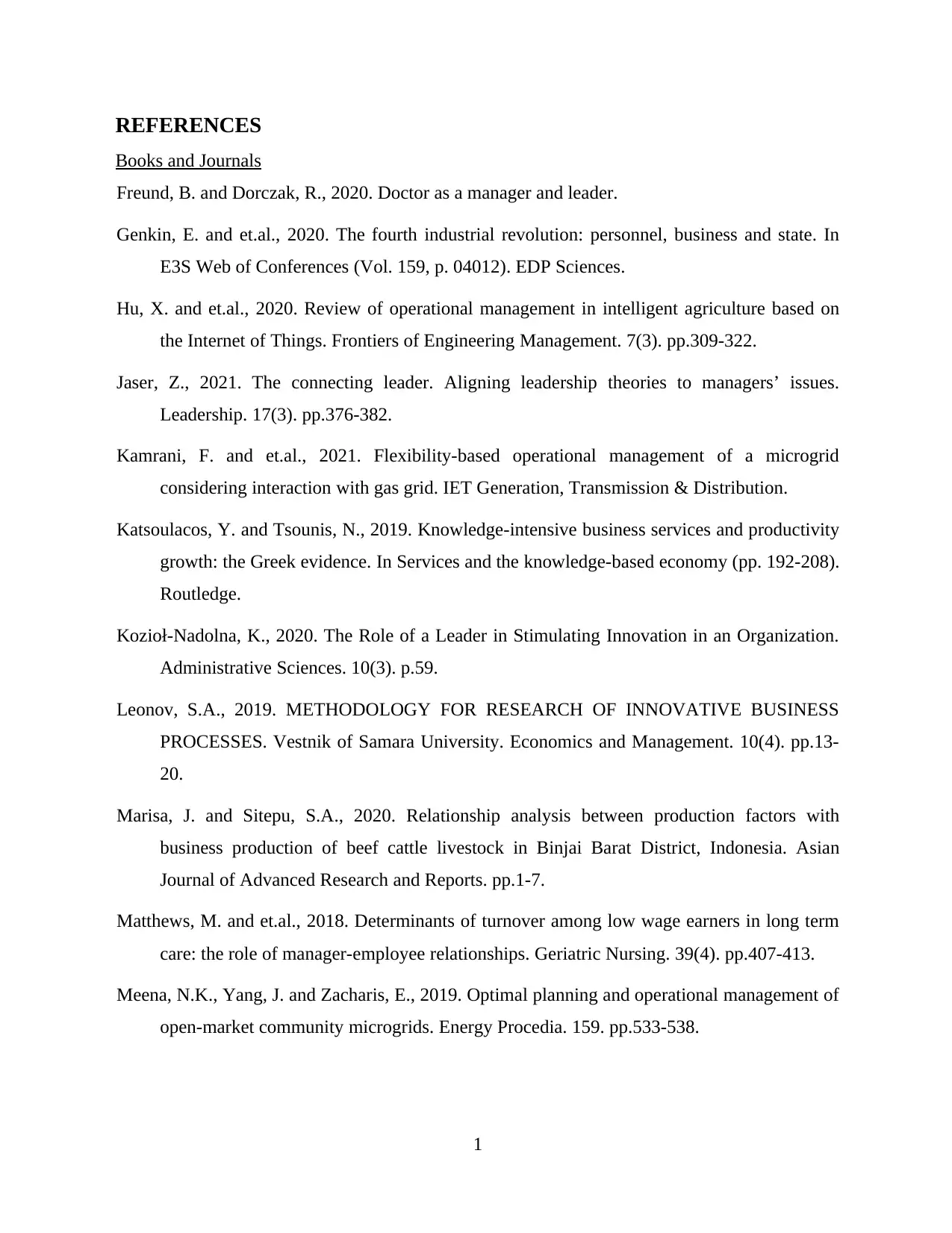
REFERENCES
Books and Journals
Freund, B. and Dorczak, R., 2020. Doctor as a manager and leader.
Genkin, E. and et.al., 2020. The fourth industrial revolution: personnel, business and state. In
E3S Web of Conferences (Vol. 159, p. 04012). EDP Sciences.
Hu, X. and et.al., 2020. Review of operational management in intelligent agriculture based on
the Internet of Things. Frontiers of Engineering Management. 7(3). pp.309-322.
Jaser, Z., 2021. The connecting leader. Aligning leadership theories to managers’ issues.
Leadership. 17(3). pp.376-382.
Kamrani, F. and et.al., 2021. Flexibility-based operational management of a microgrid
considering interaction with gas grid. IET Generation, Transmission & Distribution.
Katsoulacos, Y. and Tsounis, N., 2019. Knowledge-intensive business services and productivity
growth: the Greek evidence. In Services and the knowledge-based economy (pp. 192-208).
Routledge.
Kozioł-Nadolna, K., 2020. The Role of a Leader in Stimulating Innovation in an Organization.
Administrative Sciences. 10(3). p.59.
Leonov, S.A., 2019. METHODOLOGY FOR RESEARCH OF INNOVATIVE BUSINESS
PROCESSES. Vestnik of Samara University. Economics and Management. 10(4). pp.13-
20.
Marisa, J. and Sitepu, S.A., 2020. Relationship analysis between production factors with
business production of beef cattle livestock in Binjai Barat District, Indonesia. Asian
Journal of Advanced Research and Reports. pp.1-7.
Matthews, M. and et.al., 2018. Determinants of turnover among low wage earners in long term
care: the role of manager-employee relationships. Geriatric Nursing. 39(4). pp.407-413.
Meena, N.K., Yang, J. and Zacharis, E., 2019. Optimal planning and operational management of
open-market community microgrids. Energy Procedia. 159. pp.533-538.
1
Books and Journals
Freund, B. and Dorczak, R., 2020. Doctor as a manager and leader.
Genkin, E. and et.al., 2020. The fourth industrial revolution: personnel, business and state. In
E3S Web of Conferences (Vol. 159, p. 04012). EDP Sciences.
Hu, X. and et.al., 2020. Review of operational management in intelligent agriculture based on
the Internet of Things. Frontiers of Engineering Management. 7(3). pp.309-322.
Jaser, Z., 2021. The connecting leader. Aligning leadership theories to managers’ issues.
Leadership. 17(3). pp.376-382.
Kamrani, F. and et.al., 2021. Flexibility-based operational management of a microgrid
considering interaction with gas grid. IET Generation, Transmission & Distribution.
Katsoulacos, Y. and Tsounis, N., 2019. Knowledge-intensive business services and productivity
growth: the Greek evidence. In Services and the knowledge-based economy (pp. 192-208).
Routledge.
Kozioł-Nadolna, K., 2020. The Role of a Leader in Stimulating Innovation in an Organization.
Administrative Sciences. 10(3). p.59.
Leonov, S.A., 2019. METHODOLOGY FOR RESEARCH OF INNOVATIVE BUSINESS
PROCESSES. Vestnik of Samara University. Economics and Management. 10(4). pp.13-
20.
Marisa, J. and Sitepu, S.A., 2020. Relationship analysis between production factors with
business production of beef cattle livestock in Binjai Barat District, Indonesia. Asian
Journal of Advanced Research and Reports. pp.1-7.
Matthews, M. and et.al., 2018. Determinants of turnover among low wage earners in long term
care: the role of manager-employee relationships. Geriatric Nursing. 39(4). pp.407-413.
Meena, N.K., Yang, J. and Zacharis, E., 2019. Optimal planning and operational management of
open-market community microgrids. Energy Procedia. 159. pp.533-538.
1
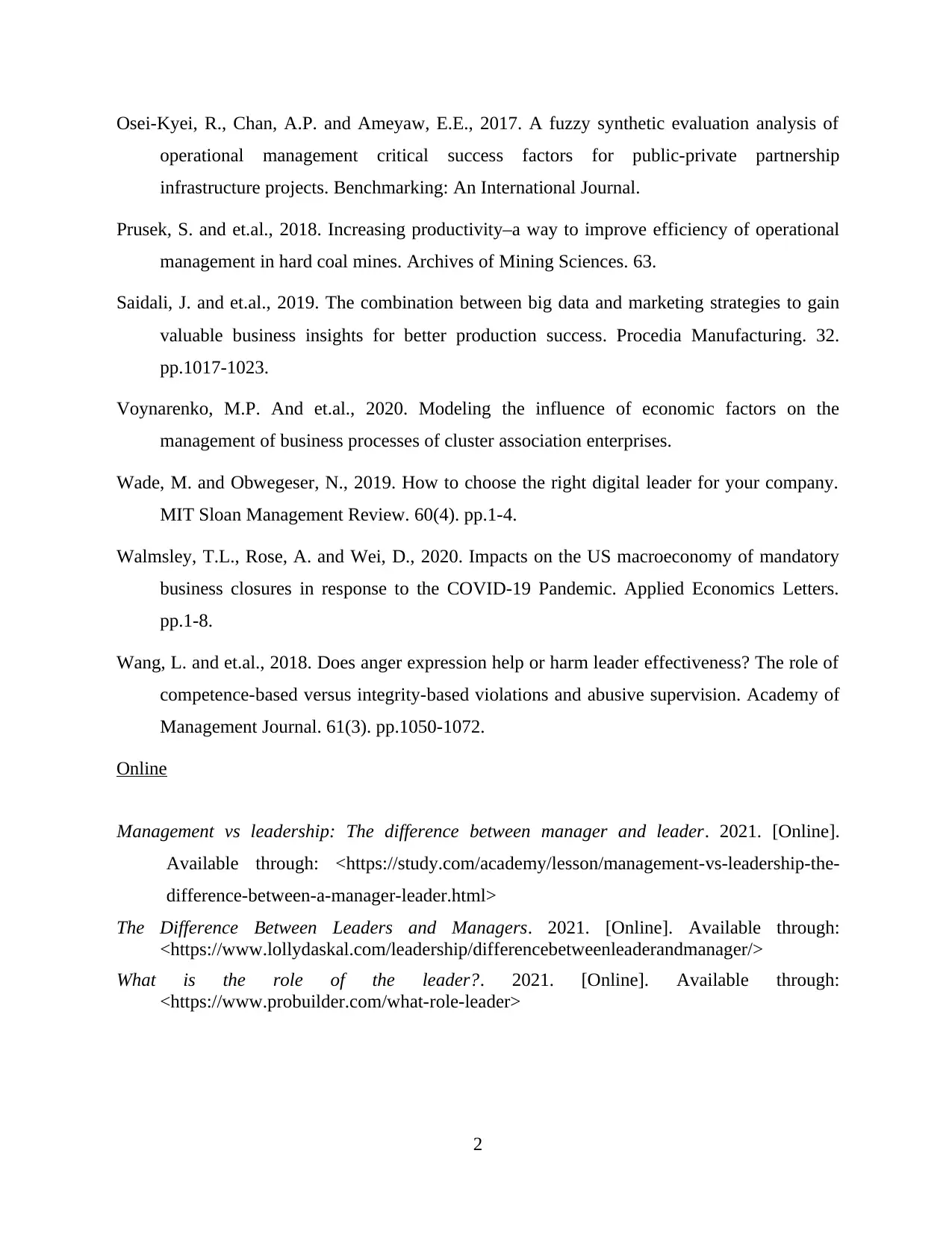
Osei-Kyei, R., Chan, A.P. and Ameyaw, E.E., 2017. A fuzzy synthetic evaluation analysis of
operational management critical success factors for public-private partnership
infrastructure projects. Benchmarking: An International Journal.
Prusek, S. and et.al., 2018. Increasing productivity–a way to improve efficiency of operational
management in hard coal mines. Archives of Mining Sciences. 63.
Saidali, J. and et.al., 2019. The combination between big data and marketing strategies to gain
valuable business insights for better production success. Procedia Manufacturing. 32.
pp.1017-1023.
Voynarenko, M.P. And et.al., 2020. Modeling the influence of economic factors on the
management of business processes of cluster association enterprises.
Wade, M. and Obwegeser, N., 2019. How to choose the right digital leader for your company.
MIT Sloan Management Review. 60(4). pp.1-4.
Walmsley, T.L., Rose, A. and Wei, D., 2020. Impacts on the US macroeconomy of mandatory
business closures in response to the COVID-19 Pandemic. Applied Economics Letters.
pp.1-8.
Wang, L. and et.al., 2018. Does anger expression help or harm leader effectiveness? The role of
competence-based versus integrity-based violations and abusive supervision. Academy of
Management Journal. 61(3). pp.1050-1072.
Online
Management vs leadership: The difference between manager and leader. 2021. [Online].
Available through: <https://study.com/academy/lesson/management-vs-leadership-the-
difference-between-a-manager-leader.html>
The Difference Between Leaders and Managers. 2021. [Online]. Available through:
<https://www.lollydaskal.com/leadership/differencebetweenleaderandmanager/>
What is the role of the leader?. 2021. [Online]. Available through:
<https://www.probuilder.com/what-role-leader>
2
operational management critical success factors for public-private partnership
infrastructure projects. Benchmarking: An International Journal.
Prusek, S. and et.al., 2018. Increasing productivity–a way to improve efficiency of operational
management in hard coal mines. Archives of Mining Sciences. 63.
Saidali, J. and et.al., 2019. The combination between big data and marketing strategies to gain
valuable business insights for better production success. Procedia Manufacturing. 32.
pp.1017-1023.
Voynarenko, M.P. And et.al., 2020. Modeling the influence of economic factors on the
management of business processes of cluster association enterprises.
Wade, M. and Obwegeser, N., 2019. How to choose the right digital leader for your company.
MIT Sloan Management Review. 60(4). pp.1-4.
Walmsley, T.L., Rose, A. and Wei, D., 2020. Impacts on the US macroeconomy of mandatory
business closures in response to the COVID-19 Pandemic. Applied Economics Letters.
pp.1-8.
Wang, L. and et.al., 2018. Does anger expression help or harm leader effectiveness? The role of
competence-based versus integrity-based violations and abusive supervision. Academy of
Management Journal. 61(3). pp.1050-1072.
Online
Management vs leadership: The difference between manager and leader. 2021. [Online].
Available through: <https://study.com/academy/lesson/management-vs-leadership-the-
difference-between-a-manager-leader.html>
The Difference Between Leaders and Managers. 2021. [Online]. Available through:
<https://www.lollydaskal.com/leadership/differencebetweenleaderandmanager/>
What is the role of the leader?. 2021. [Online]. Available through:
<https://www.probuilder.com/what-role-leader>
2
1 out of 15
Related Documents
Your All-in-One AI-Powered Toolkit for Academic Success.
+13062052269
info@desklib.com
Available 24*7 on WhatsApp / Email
![[object Object]](/_next/static/media/star-bottom.7253800d.svg)
Unlock your academic potential
© 2024 | Zucol Services PVT LTD | All rights reserved.





